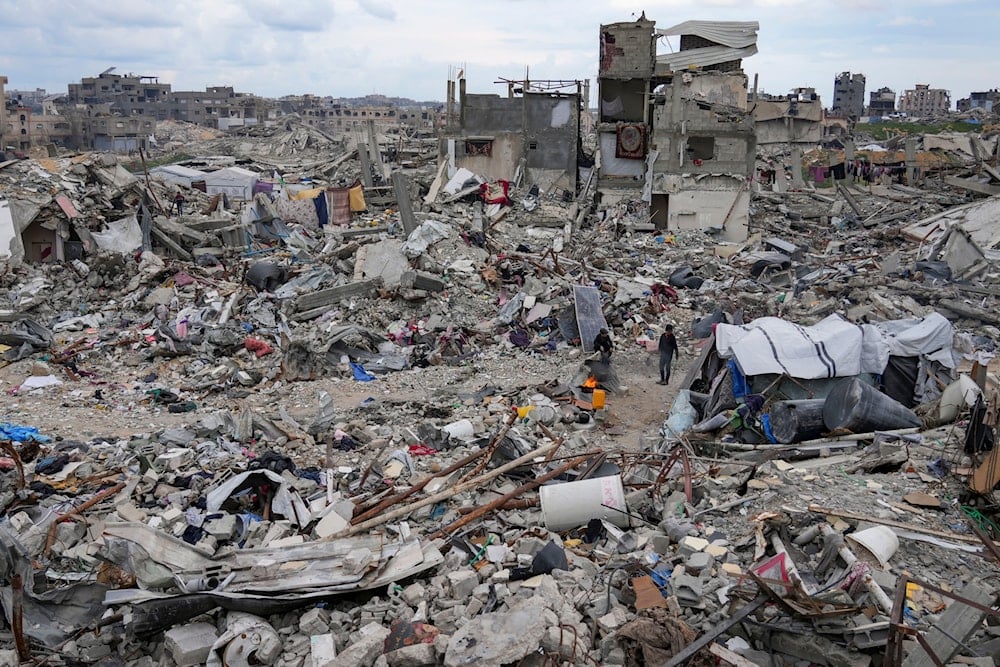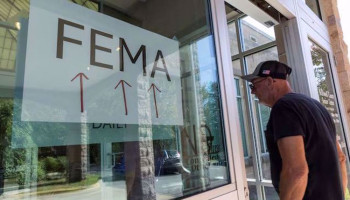forcibly evacuated, followed by widespread destruction through airstrikes or controlled demolitions.
“Then the bulldozers come in and strip the land clean, as if no one ever lived there,” he stressed. “We’re only 20 kilometers away from these areas, and still, Israeli warplanes are tracking our every move. No one’s talking about it anymore because no one remains to witness or document what’s happening.”
Crushing evidence, literally
Palestinian journalist Wael Abu Omar echoed these concerns, noting a troubling shift in the visibility of Israeli operations: “We’re now seeing crushers working in plain sight,” he said.
“Heavy machinery is being used to pulverize the rubble, everything that enters is reduced to dust or powder. There is absolutely no oversight, and no one on the ground has the means or access to document what’s really happening,” Abu Omar added.
As Israeli machinery grinds Gaza’s ruins into raw materials, Palestinians are left sifting through what remains of their lives. With cement and steel nearly impossible to obtain, many families have resorted to salvaging fragments of their destroyed homes, recycling broken bricks, bent rebar, and shattered tiles in a desperate, defiant effort to rebuild.
“People are doing everything they can just to restore a single room,” Abu Omar explained. “They’re using broken stones to rebuild, even just a corner of their homes, as a symbol of resilience.”
More than just theft
But Abu Omar warned that the looting isn’t simply about money. “This is a deliberate strategy to erase evidence of the war crimes committed here,” he said. “It’s meant to prevent any chance of return or reconstruction, and to expand 'Israel’s' military grip.”
He concluded with a stark contrast: “To us, the rubble represents life, a chance to rebuild. To the occupation, it’s a tool. They use it to build illegal settlements and to clear sightlines in military zones, eliminating the tactical cover that destroyed buildings might offer to resistance fighters.”
Erasing evidence and forcing displacement: Gaza’s vanishing rubble
In southern Gaza, the destruction isn’t just visible, it’s strategic. According to Mohammad al-Haj Youssef, spokesperson for the Civil Defense in Rafah, "Israel" is deliberately transforming Gaza into an uninhabitable zone.
“The occupation is trying to make Gaza a place unfit for life, forcing people to abandon their homeland,” he told Al Mayadeen net.
With basic resources cut off and fuel supplies scarce, many families are turning to unconventional means of survival.
“Some households are burning scraps of wood and plastic from their destroyed homes to cook or keep their children warm,” Youssef explained. “The rubble has become a tool for resistance, a means of staying alive.”
But he warned that more is at stake than survival; the debris itself may hold critical forensic value.
“Remnants like missile fragments, bomb casings, and shrapnel could serve as material evidence for international investigators,” Youssef stressed. “That’s precisely why 'Israel' is so intent on clearing everything, not just for tactical or logistical reasons, but to erase the physical proof of its crimes. Every truckload of rubble removed is a potential war crime buried, a silenced witness that could otherwise speak in international courts or be exposed by the global media.”
Looting the rubble: A blow to Gaza’s reconstruction
Economist Ahmad Abu Qamar sees the rubble not as waste, but as untapped economic value. “Gaza’s debris is part of a circular economy,” he told Al Mayadeen Net. “It contains valuable materials like cement, steel, and electrical wiring; it’s not conventional trash.”
Estimates from the UN Development Programme and Gaza’s Ministry of Public Works suggest that over 50 million tons of rubble now cover the Strip. In a functioning economy, such volume could support vital development projects.
“That amount could be used for port development or coastal land reclamation,” Abu Qamar noted. Instead, he says, "Israel" has capitalized on the destruction.
“This is a double crime,” he said. “'Israel' didn’t just destroy Gaza’s infrastructure and economy, it turned the debris into a booming business, establishing recycling plants inside the occupied territories and using the materials for profitable infrastructure projects.”
According to Abu Qamar, the removal of rubble by Israeli occupation forces will have severe financial consequences for Palestinian recovery efforts.
“Stealing the debris will drive up the cost of reconstruction by more than 20%,” he warned. “Had these materials been retained locally, they could have played a crucial role in easing the burden of rebuilding, especially amid the severe shortage of cement, steel, and basic construction supplies. Every truckload taken is not just theft, it’s a direct blow to Gaza’s ability to recover.”
Source:Websites







